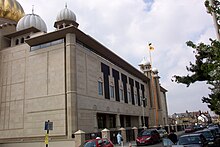
Southall is a large suburban town in West London, England, part of the London Borough of Ealing and is one of its seven major towns.
The following outline is provides an overview of Sikhism, or Sikhi.
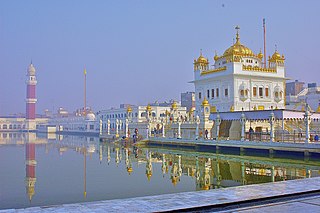
Tarn Taran Sahib is a city in the Majha region of the state of Punjab, in northern India. It is the district headquarters and hosts the municipal council of Tarn Taran district. Gurdwara Sri Tarn Taran Sahib, a prominent Sikh shrine, is located in the central part of the city.

Anandpur Sahib, also referred simply as Anandpur, is a city in Rupnagar district (Ropar), on the edge of Shivalik Hills, in the Indian state of Punjab. Located near the Sutlej River, the city is one of the most sacred religious places in Sikhism, being the place where the last two Sikh Gurus, Guru Tegh Bahadur and Guru Gobind Singh, lived. It is also the place where Guru Gobind Singh founded the Khalsa Panth in 1699. The city is home to Takhat Sri Kesgarh Sahib, the third of the five Takhts in Sikhism.
Ravidassia or the Ravidas Panth is a religion based on the teachings of Guru Ravidas. It was considered a sect within Sikhism until 2009. However, some Ravidassias continue to maintain Sikh religious practices, including the reverence of the Guru Granth Sahib as their focal religious text, wearing Sikh articles of faith (5Ks), and appending Singh or Kaur to their names.
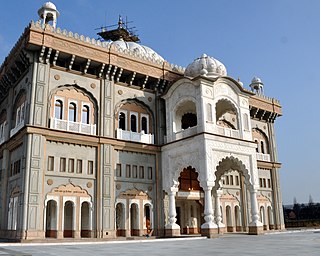
British Sikhs number over 535,000 people and account for 0.8% of the British population as of 2021, forming the United Kingdom's fourth-largest religious group. According to the 2021 United Kingdom census, British Sikhs numbered 535,517, with 520,092 in England, 10,988 in Scotland, 4,048 in Wales, and 389 in Northern Ireland. The largest Sikh populations in the United Kingdom are in the West Midlands and Greater London.
The Ramdasia were historically a Sikh, Hindu sub-group that originated from the caste of leather tanners and shoemakers known as Chamar.

The Delhi Sikh Gurdwara Management Committee (DSGMC) is organization in India responsible for the management of Gurdwaras, Sikh places of worship in Delhi. It also manages various educational institutions, hospitals, old age homes, libraries and other charitable institutions in Delhi. It is headquartered in Gurdwara Rakab Ganj Sahib, near Parliament House. Currently, the president of DSGMC is Harmeet Singh Kalka.
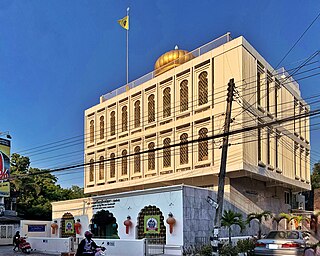
Sikhism is a recognised minority religion in Thailand, with about 70,000 adherents. The religion was brought by migrants from India who began to arrive in the late 19th century. There are about twenty Sikh temples or Gurdwaras in the country, including the Gurdwara Sri Guru Singh Sabha in Bangkok.

German Sikhs are a growing religious minority in Germany. The majority of German Sikhs have their roots from the Punjab, India with the remaining coming from the Afghan Sikh community or through conversion. The number of Sikhs is estimated to be between 25,000. Germany had the fifth highest Sikh population in Europe after United Kingdom (524,000), Italy (220,000), Portugal (35,000) and Spain (26,000).

Dutch Sikhs form a religious minority in the Netherlands. They number around 15,000 and most of them live in or around Amsterdam. There are nine gurudwaras in the Netherlands.

English Sikhs number over 520,000 people and account for 0.9% of England's population in 2021, forming the country's fourth-largest religious group. In 2006 there were 352 gurdwaras in England. The largest Sikh populations in the U.K. are in the West Midlands and Greater London.

Choor Singh Sidhu, known professionally as Choor Singh, was a Singaporean lawyer who served as a judge of the Supreme Court of Singapore and, particularly after his retirement from the bench, a philanthropist and writer of books about Sikhism. Born to a family of modest means in Punjab, India, he came to Singapore at four years of age. He completed his secondary education in the top class at Raffles Institution in 1929, then worked as a clerk in a law firm before becoming a civil servant in the Official Assignee's office.

Malaysian Sikhs are known to be the fourth largest Malaysian Indian ethnic group. It is estimated that there are around 100,000 Sikhs in Malaysia.
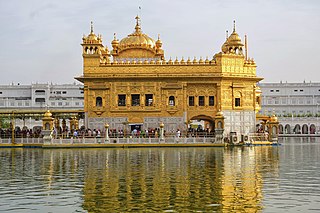
The Golden Temple (also known as the Harmandir Sahib, or the Darbār Sahib, is a gurdwara located in the city of Amritsar, Punjab, India. It is the pre-eminent spiritual site of Sikhism. It is one of the holiest sites in Sikhism, alongside the Gurdwara Darbar Sahib Kartarpur in Kartarpur, and Gurdwara Janam Asthan in Nankana Sahib.

Sikhism in the United Arab Emirates has a following of over 50,000; the majority of Sikhs in the UAE can be found in Dubai, Abu Dhabi or Sharjah.
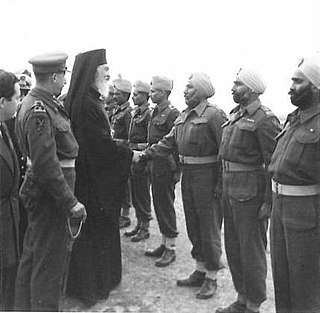
Sikhism in Greece dates back to the early 1900s, where many Sikhs came to the country through British Indian Army in the World War I and World War II. As of 2012, there are approximately 20,000 Sikhs in Greece. The Sikh population in Greece has grown over the years, with many Sikhs migrating to the country for agricultural work or to start their own businesses.
Gurdwara Sri Guru Singh Sabha is a Sikh gurdwara, or Sikh house of worship, in Delhi, India. It also known as the Gurdwara Pahari Wala or Pahariwala.
